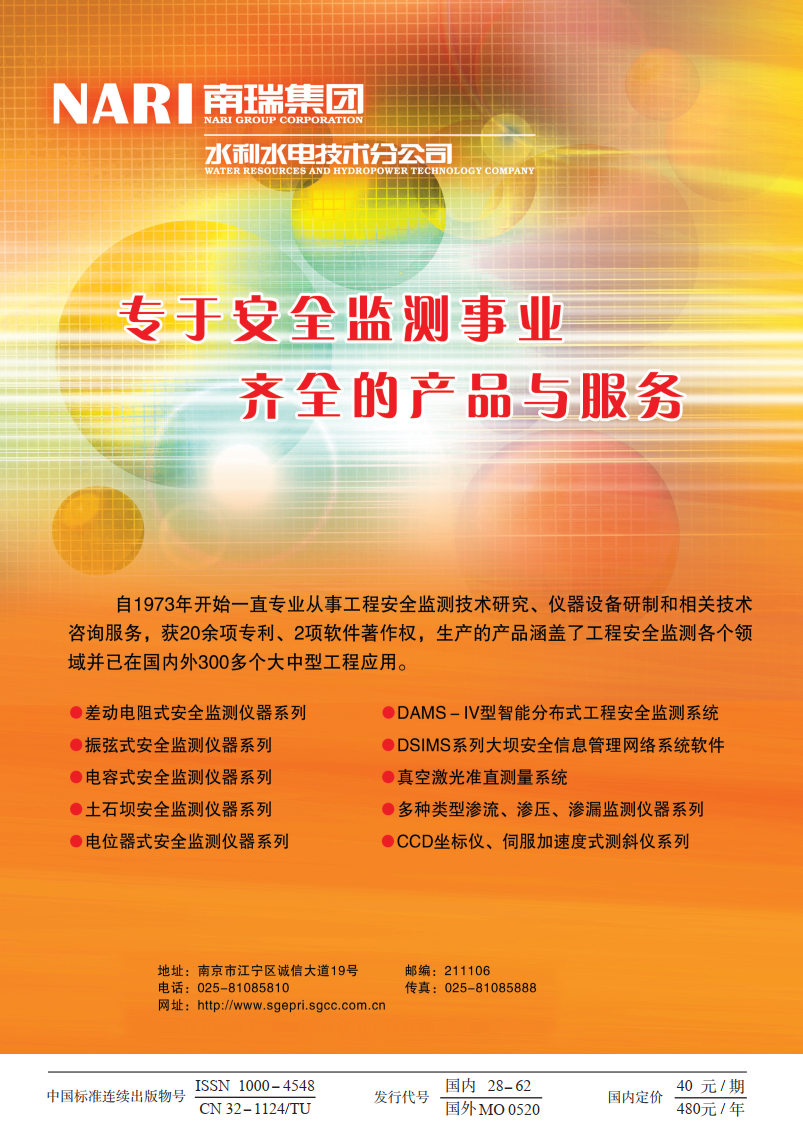Experimental study on construction parameters of collapsible loess foundation treated by vibrating rod compaction method
-
摘要: 为了确定振杆密实法处理湿陷性黄土地基的施工参数,利用自主研发的振杆密实法设备在湿陷性黄土地基场地开展现场试验研究,分析振动频率、钻头形式、喷气压力、振点间距对施工效率和处理效果的影响。试验结果表明:在该场地条件下,当振动频率为16 Hz,采用A型组合钻头能减少翼片土体黏结,施工速率和密实效果最优;0.8 MPa的高压喷气可辅助振杆下沉,该气压下地基土的承载力提升明显。采用上述参数,控制不同振点间距处理后的湿陷性黄土地基锥尖阻力和侧壁阻力提升约200%~300%,振点间距越小,加固效果越显著,但振点间距过小容易造成串孔现象,以1.2~1.4 m为宜。研究成果可为振杆密实法在湿陷性黄土地基中的进一步应用提供技术参考。Abstract: In order to determine the construction parameters of the vibrating rod compaction method to treat the collapsible loess foundation, the self-developed vibrating rod compaction method equipment is used to carry out field tests on the collapsible loess foundation site to analyze the vibration frequency, drill bit form, jet pressure and influences of vibration point spacing on construction efficiency and treatment effect. The test results indicate that under the conditions of the site, when the vibration frequency is 16 Hz, the use of A-type combined drill bits can reduce the adhesion of the fin soil, and the construction rate and compaction effect are the best. The high-pressure jet of 0.8 MPa can assist the sinking of the vibrating rod. Under this pressure, the bearing capacity of the foundation soil increases significantly. Using the above parameters, the cone tip resistance and sidewall resistance of the collapsible loess foundation after treatment with different vibration point spacings are controlled to increase by about 200%~300%. The smaller the vibration point spacing, the more significant the reinforcement effect, but the smaller the vibration point spacing is easy cause bonding, 1.2~1.4 m is appropriate. The research results can provide technical reference for the further application of the vibrating rod compaction method in collapsible loess foundation.
-
-
表 1 施工设备主要参数
Table 1 Main parameters of construction equipments
电机功率/kW 激振力/kN 喷气压力/MPa 可调频率/Hz 深度/m 振杆直径/m 90 530 0.5~1.2 0~30 ≤15 0.7 -
[1] 刘松玉, 程远. 共振法加固公路可液化地基试验[J]. 中国公路学报, 2012, 25(6): 24-29. doi: 10.3969/j.issn.1001-7372.2012.06.004 LIU Song-yu, CHENG Yuan. Resonance compaction method for highway ground improvement at liquefaction site[J]. China Journal of Highway and Transport, 2012, 25(6): 24-29. (in Chinese) doi: 10.3969/j.issn.1001-7372.2012.06.004
[2] 刘松玉, 杜广印, 毛忠良, 等. 振杆密实法处理湿陷性黄土地基试验研究[J]. 岩土工程学报, 2020, 42(8): 1377-1383. https://www.cnki.com.cn/Article/CJFDTOTAL-YTGC2021S2056.htm LIU Song-yu, DU Guang-ying, MAO Zhong-liang, et al. Field tests on improvement of collapsible loess by vibratory probe compaction method[J]. Chinese Journal of Geotechnical Engineering, 2020, 42(8): 1377-1383. (in Chinese) https://www.cnki.com.cn/Article/CJFDTOTAL-YTGC2021S2056.htm
[3] CHOW K Y. Deep Compaction of Sand Using Vibratory Probe[D]. Singapore: Nanyang Technological University, 1998.
[4] 程远, 韩杰, 朱合华, 等. 振杆密实法加固粉土地基效果试验[J]. 中国公路学报, 2019, 32(3): 63-70. doi: 10.19721/j.cnki.1001-7372.2019.03.007 CHENG Yuan, HAN Jie, ZHU He-hua, et al. Vibratory probe compaction effect on silty foundation treatment[J]. China Journal of Highway and Transport, 2019, 32(3): 63-70. (in Chinese) doi: 10.19721/j.cnki.1001-7372.2019.03.007
[5] MASSARSCH K R, FELLENIUS B H. Vibratory compaction of coarse-grained soils[J]. Canadian Geotechnical Journal, 2002, 39(3): 695-709. doi: 10.1139/t02-006
[6] 程远. 振杆密实法加固可液化地基理论与应用研究[D]. 南京: 东南大学, 2013. CHENG Yuan. Theory Study and Engineering Application on Vibratory Probe Compaction Method for Ground Improvement at Liquefaction Site[D]. Nanjing: Southeast University, 2013. (in Chinese)
[7] BROWN R E, GLENN A J. Vibroflotation and terra-probe comparison[J]. Journal of the Geotechnical Engineering Division, 1976, 102(10): 1059-1072. doi: 10.1061/AJGEB6.0000331
[8] WALLAYS M. Deep compaction by vertical and horizontal vibration[J]. Geotechnical Engineering, 1983, 14(1): 55-78.
[9] JANES H W. Densification of sand for drydock by Terra-Probe[J]. Journal of Soil Mechanics and Foundations Division, 1973, 99(6): 451-470. doi: 10.1061/JSFEAQ.0001888
[10] MASSARSCH K R, FELLENIUS B H. Deep Vibratory Compaction of Granular Soils[M]//Elsevier Geo-Engineering Book Series. Elsevier, 2005, 3: 539-561.
-
期刊类型引用(9)
1. 孟凌霄,徐龙伟,王桂梅,姜润豪,孙湲惠,许英东,付涛. 接头形式与位置对装配式箱涵动力性能影响研究. 市政技术. 2024(06): 142-149 .  百度学术
百度学术
2. 李国维,米帅奇,仇红超,吴建涛,李军,吴桂胜. 深埋盖板涵路基填土应力场分布特征试验研究. 岩石力学与工程学报. 2022(11): 2311-2319 .  百度学术
百度学术
3. 王伟. 高速公路高填土路基病害及处理措施研究. 交通世界. 2021(Z2): 71-72 .  百度学术
百度学术
4. 陶庆东,何兆益,贾颖. 结构参数与填料特性对盖板涵洞土涵作用影响. 地下空间与工程学报. 2021(02): 468-478 .  百度学术
百度学术
5. 米帅奇,陈伟,苏彤,AGO Cadnel. 涵周土性状对高填方盖板涵涵顶应力影响分析. 粉煤灰综合利用. 2021(06): 34-40 .  百度学术
百度学术
6. 陶庆东,何兆益,贾颖. 涵洞-填土-地基共同作用的涵洞减载效应研究. 三峡大学学报(自然科学版). 2020(05): 67-74 .  百度学术
百度学术
7. 徐湉源,王明年,于丽. 高填方双层衬砌式明洞土压力和结构内力特性研究. 铁道学报. 2019(02): 146-153 .  百度学术
百度学术
8. 赵立芳,段金辉. 混凝土盖板涵的施工要点. 黑龙江交通科技. 2019(08): 116-117 .  百度学术
百度学术
9. 冯忠居,李少杰,郝宇萌,董芸秀,方元伟,胡海波,潘放,李军. 上埋式涵洞基础埋深效应下的地基承载力研究. 长江科学院院报. 2019(11): 83-90 .  百度学术
百度学术
其他类型引用(11)




 下载:
下载:








